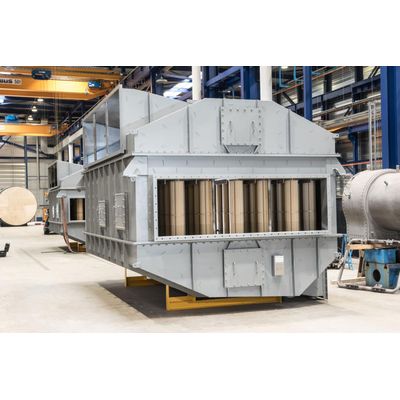

- Home
- Companies
- HeatMatrix Group B.V.
- Products
- HeatMatrix - Polymer Air PreHeater ...

HeatMatrix - Polymer Air PreHeater (APH)
Corrosion and fouling problems with air preheaters limit waste heat recovery from flue gas or exhaust air.
Flue gases from burning fuels like refinery gas, fuel oil, off gases, blast furnace gas, oil, coal, biogas and biomass contain acidic elements. When you recover all the heat you will cool the flue gas or exhaust air through the acid dew point. Acids will then condensate which leads to corrosion in conventional metal air preheaters and in the rest of the installation.
When exhaust air is cooled too deep, fouling may start to accumulate quicker and can eventually lead to blockage of your heat exchanger.
Waste heat can be recovered with air preheaters made with polymer
Heat up combustion air
The polymer air preheater is used for combustion air preheating on thermal processes. Ambient air is heated up and is fed to the burners. By burning hot combustion air instead of cold combustion air, less fuel is needed to achieve a certain duty. Due to acid condensation, heat recovery from flue gases can be demanding.
Heat up drying air
The heat from exhaust air is recovered and used to preheat fresh ambient air entering the dryer. This saves fuel on the fresh air heater. Due to the high humidity and presence of dust, heat recovery from drying processes can create corrosion and fouling problems.
The polymer air preheater is designed using Computational Fluid Dynamics to ensure homogeneous air and flue gas distribution which ensures maximum performance of the air preheater under all conditions. Due to the even distribution of the flow, the temperature of the flue gas coming out of the air preheater is everywhere the same.
The vertical downward flow of flue gas or exhaust air ensures proper drainage of condensate. Both gas and condensate flow in the same direction assisted by gravity. There are no baffles or turns where fouling can accumulate.
Liquids are separated from the cooled flue gas flow in the bottom segment of the polymer air preheater. Water and acids are removed via the drain in the waste heat recovery system
Resistant to corrosive flue gas and exhaust air
The air preheater contains polymer tube bundles, through which the flue gas or exhaust air flows. The polymer is resistant to the acids that are formed. The polymer can handle H2SO4. HCI, HF, H3PO4 and others.
Prevent heat exchanger blocking
The straight flow path of the flue gas through the air preheater and the low propensity of polymer to bind in combination with the possibility of in-line cleaning make the polymer air preheater suitable for fouling services.
Prevention of corrosion in duct and stack
Up to 80% of the acids will be condensed and removed from the flue gas by the polymer air preheater. This lowers the acid dew point substantially and prevents down stream corrosion.
The polymer air preheater consists of polymer tubes that are combined into standardized bundles. The bundles are installed in a compact metal casing.
The individual polymer tubes are interconnected using the Polymer HoneyComb Technology (PHT). This stabilizes the tubes for flow induced vibrations.
The 1.5 meter long bundles provide an intense heat exchange process. The PHT technology creates a countercurrent flow path for hot and cold gas streams. Therefor the air preheater is compact and light weight
